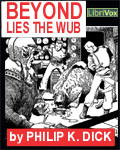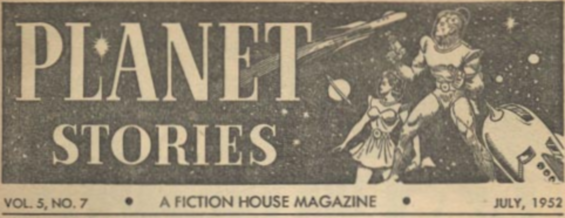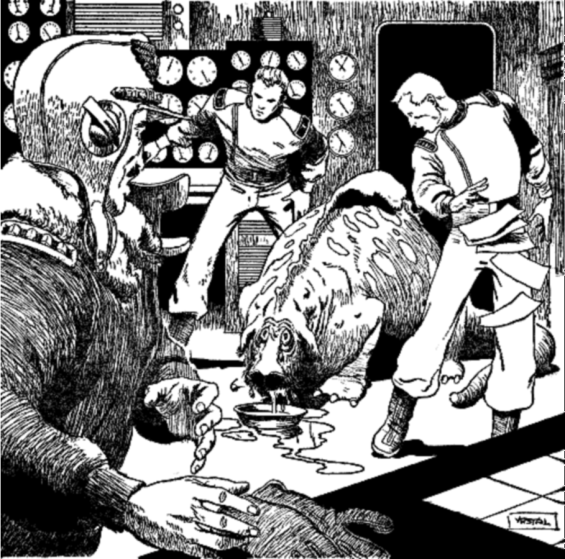
There’s probably always going to be a place in my heart for Philip K. Dick’s Beyond Lies The Wub. It was my first PKD short story. It’s very short and usually runs just over fifteen minutes read aloud – which I frequently do. And even though Dick claimed only to have been paid $15 for it*, I find it absolutely invaluable.
I’ve felt that way from the very first time I heard it, back in 2006. The narrator, Mac Kelly, delivered the story at a measured pace that really sang the story to me.
Since then I’ve become even more enamored with Gregg Margarite’s rendition, recorded for LibriVox in 2009.
And that’s the one I’d like to share with you. I share it with you now, but you can share it with your friends too because, not only is the story public domain, the audiobook itself is too!
 Beyond Lies The Wub
Beyond Lies The Wub
By Philip K. Dick; Read by Gregg Margarite
1 |MP3| – Approx. 16 Minutes [UNABRIDGED]
Publisher: LibriVox.org
Published: May 4, 2009
|ETEXT|
The slovenly wub might well have said: Many men talk like philosophers and live like fools. First published in Planet Stories, July 1952.



And here’s a combination of the narration with the magazine scans:
Posted by Jesse Willis
*As reported in Dick’s introduction to the story in First Voyages, a 1981 anthology of the first published short stories by famous SF authors.
Beyond Lies The Wub was the second story by PKD that I read. The first one was Roog. The publisher of the german edition of PKDs short story collection (contains only 30 stories – superbaaaad) didn’t put them into chronological order. Roog is a nice story but it’s a bad way to start an anthology – my two penies (okay, on the other hand, to start with Roog means: the best is yet to come) But the fact that there are only 30 stories available in german is an evidence of incapacity. There has been a complete short story collection, but it’s long out of print. If you want to get a used copy, prepare to spend a lot of money. A friend of mine owns this complete collection….wich I am -of course- jealous of.
I turned to read PKD in the original. No more translations except the ones I already have.
Anyway I am more than grateful that Gregg does such a wonderful wonderful wonderful job. He is THE voice! Even though I don’t get all the cool stuff that PKD has hidden in his stories at the first listening, to listen to Gregg’s narration one more time is the best way to get into PKD’s cosmos for a not native speaker.
Need a proof? Just listen to Gregg’s narration of Small Town. Or listen to Eight O’Clock In The Morning by Ray Nelson. There are some people who think they can read well and compared with Gregg’s voice you just can say: don’t bother!
“Beyond Lies the Wub” is an interesting early short story, that is richer than may seem at first glance. Mythology, religion, and philosophy form a backdrop to the story. In particular, there are references to Odysseus and to Epicureanism.
I think the Odysseus reference could be filled out in several ways. Odysseus does not rely on brute force like Achilles, but on intelligence, cunning, ruse. This is another case where we can identify the Wub with Odysseus, as against the Achilles-like Captain. Futher, Odysseus had the idea of the Trojan Horse, and now the Captain’s body is a Trojan Horse concealing the Wub and carrying it back to Earth.
The eating of the Wub feels like a Eucharist scene, given that he talked about the parable of your Saviour, so “this is my body”; especially as it was accompanied by wine.
The little introduction: ” The slovenly wub might well have said: Many men talk like philosophers and live like fool.” seems to be a reference to the Epicurean philosophers, who held pleasure as the highest good. They were compared to swine by their critiques, mere gluttons. According to John Stuart Mill:
“When thus attacked, the Epicureans have always answered, that it is not they, but their accusers, who represent human nature in a degrading light; since the accusation supposes human beings to be capable of no pleasures except those of which swine are capable”
This seems to be the case in the story, where Captain Franco is the true swine (all he can think of is eating the wub, he has no care for its intelligence and culture, and so lives like a fool), despite his human body. The Wub is the philosopher despite his swine body (although he does take pleasure in eating too).
As for the name “wub”, I think it may be a “nonce word”, coined to be used for the occasion, for the nonce. It resembles Lewis Carroll’s “wabe” in Jabberwocky, which Humpty Dumpty glosses as the grass around a sundial because it “goes a long way before it, and a long way behind it”. As there is “beyond” in the title, this suggests that the wub, which originated “way behind us” in time, lies “way beyond” us in evolution and mental capacity.
Note: the idea that there is an Epicurean reference, however playful, is confirmed by the sequel “Not by its Cover”, which I have not yet read. According to the Wikipedia entry:
“Wub fur, so the story suggests, continues to live after the “death” of the Wub, and as such is highly prized owing to its postmortem production of a luxurious pelt that has numerous, albeit trivial, human applications. One such application is its use as a book cover by a Mars based publisher who issues a new Latin volume of Lucretius’ poem De Rerum Natura (On the Nature of Things)”.